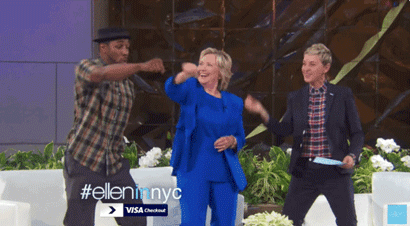Tuesday morning, the Hillary Clinton camp tweeted about a soon-to-be-released interview between the former Secretary of State and Girls auteur Lena Dunham. In a short teaser clip, Dunham asks the presidential candidate if she considers herself to be a feminist; Clinton emphatically responds “Yes, absolutely” before elaborating on her definition of feminism as the belief that women and men ought to share equal rights.
According to Politico, the full interview will cover Clinton’s college life and her early twenties, her career path, and campaign issues such as women’s health and student debt. The video segment, which will be available to Dunham’s newsletter subscribers via LennyLetter.com, includes comedy sketches filmed at Clinton’s Brooklyn campaign headquarters, and even features an Amy Schumer cameo—clearly, Clinton’s campaign advisers are playing a strategic game of millennial Clue.
But filming Clinton with [insert white, feminist millennial icon here] in [insert hipster enclave here] isn’t just fun and games. With women comprising 52 percent of the American electorate, and an astounding 50 percent of millenials identifying as independents, the 2016 presidential elections just might come down to which candidate you’d rather share a fair trade kombucha with.
From doing the whip (AND the nae nae) on national television to “having” “fun” in a “candid” “manner” with Jimmy Fallon, to heavily featuring the famous Dunham in her latest campaign ads, Clinton is clearly thirsting for the twentysomething demographic. Riding the zeitgeist might be blatant political pandering, but it has been historically effective—after Obama appeared on Zach Galifianakis’s uber-trendy Between Two Ferns web series in 2014, healthcare.gov's online traffic got a 40 percent boost.
From a strange Refinery29 interview to gabbing with Dunham about turning down Bill’s marriage proposal (twice!), Clinton is obviously trying to cast herself in a similarly youthful, relatable light. As Dunham shared, the motives behind the one-on-one included urging millenials to “get to know Hillary as a person…to show young women she was also, at one point, a woman at a crossroads, young, confused—she wasn’t always this sort of political titan figure that she presents us today.”
Of course, targeted pandering is par for the course—but Clinton’s next-level transparency is about as easy breezy as a Covergirl commercial (and similarly whitewashed). Dancing with Ellen DeGeneres isn’t going to make any of Clinton’s detractors magically want to hang out with her any more than Jeb Bush’s overpriced, whitewashed “Guaca Bowle” will convince Hispanic voters that Jeb Bush actually cares about Hispanic voters. With that being said, seeing as the only other major female player in the field of presidential candidates is waging a war against women’s health, Clinton would appear to have a natural advantage among lady millenials.
And when it comes to twentysomething women, particularly of the liberal, HBO GO-subscribing variety, Lena Dunham holds immeasurable clout. The 29-year-old author, actress, and full-time polarizing figure isn’t shy about her political opinions. Since supporting Obama with a 2012 campaign ad, Dunham has heightened her focus on promoting women’s issues publicly, campaigning on behalf of Planned Parenthood via her Instagram and Twitter accounts.

In many ways, Dunham’s entire public persona is a rallying cry for young women; she uses her social-media savvy to effect change and start crucial conversations, and she fights conservative slut-shaming and misogyny via a gender studies 101 cocktail of body positivity, creative expression, and self-love. But to borrow from Dunham’s own trendy lexicon, the Brooklyn scene queen is highly problematic.
While Lena Dunham shares Clinton’s stated commitment to millennial-friendly lady issues, it’s important to note just how polarizing this political alliance could be. In her efforts to include female millenials in the national discourse, Dunham has often been accused of exclusionary practices. Many of Clinton’s much-sought millenials are likely to shudder at the visual of a gingham-clad, privileged Dunham giggly grilling Clinton on feminist issues in a gentrified Brooklyn office. Young women who were raised on an intersectional ideal will inherently distrust Clinton’s alignment with the current figurehead of white hipster feminism. While agreeing to an interview with a youthful personality on an online platform might initially poll as trendy and forward-thinking, it ultimately reinforces Clinton’s public image as an overly pragmatic political insider.
Say what you will about Generation Y, but we know a publicity stunt when we see one, and two self-congratulatory white ladies praising each other’s career accomplishments won’t inspire us come Election Day. It’s going to take more than a whip (AND a nae nae!) to convince us that Hillary is willing to do more than just play it safe, and is actually equipped to address the issues that female millenials truly care about across racial and class divides, instead of just pandering to the Williamsburg coffee shop set.





